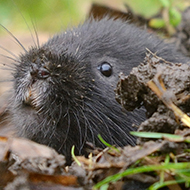
Researchers developed the tool for use during urban planning and city development.
An interactive map has been developed to map suitable habitats for European water voles in Glasgow.
Researchers from the University of Glasgow, in collaboration with partners from Glasgow City Council, NatureScot and Seven Lochs Wetland Park, have developed the tool to protect the species during urban planning and city development.
Published in the Journal of Applied Ecology, it is hoped that this new tool and the work accompanying it will help to conserve the species.
Luca Nelli, lead author of the study, 'Predicting habitat suitability and connectivity for management and conservation of urban wildlife: A real-time web application for grassland water voles', said: “With our work we wanted to develop a user-friendly tool for conservation, that can be used by planners to inform ecological decision making, increase biodiversity and reduce human-wildlife conflict in urban environments.
“This model will be used to inform management of water voles, balance the legal protection of this species, maintain green amenity space for local people, and to inform the planning of building and infrastructure for the socio-economic development of affected areas.
“We also hope this will provide a framework for applying similar practices to the management of other species and habitats in urban environments.”
The web tool is currently being using for the management and conservation of water voles in North East Glasgow and Seven Lochs Wetland Park.
Catherina Scott, co-author of the study from Glasgow City Council, commented: “This new research will feed into the existing planning system and is invaluable in providing additional guidance to help balance both the needs of biodiversity and a thriving city.
“After all, well connected greenspace which provides the habitat connectivity required for this nationally significant species, can also provide the active travel routes to work, school and play for residents.
“And by identifying the core areas of biodiversity interest, other areas can be unlocked for regeneration projects.”
Images (C) Lorne Gill, NatureScot



 The latest
The latest